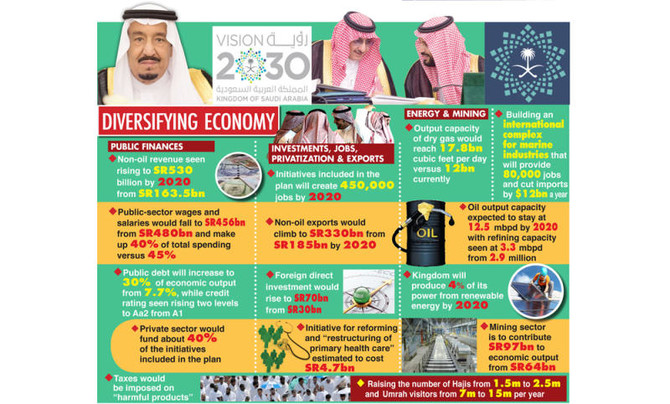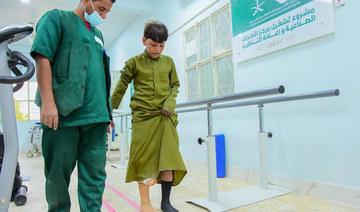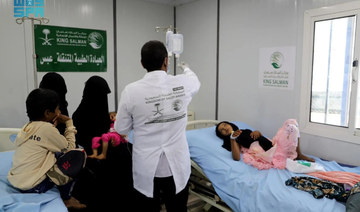JEDDAH: Saudi Arabia has announced a plan for the next five years to triple revenue from non-oil sources, tax expatriates and goods, reduce water and electricity subsidies, cut public sector salaries and ensure a greater involvement of the private sector in the economy, as part of a long-term initiative to reduce the country’s dependence on oil.
The details of the SR268 billion National Transformation Program (NTP), contained in a 112-page document, were approved late Monday by the Cabinet, chaired by Custodian of the Two Holy Mosques King Salman. The NTP is part of Vision 2030, being spearheaded by the Council of Economic and Development Affairs chaired by Deputy Crown Prince Mohammed bin Salman.
The NTP aims to boost non-oil revenue to SR530 billion by 2020, creating some 450,000 non-government jobs, according to comments by ministers, documents given to the media at a press conference in Jeddah on Monday, and reports from the Saudi Press Agency and other sources.
The plan aims to “enhance the level and quality of services” provided by government and “achieve a prosperous future and sustainable development,” it said. The NTP, which includes over 500 projects and initiatives as well as performance indicators for ministries and other government agencies, will cost around SR270 billion to implement, the document stated.
Minister of State Mohammed Al-Asheikh said the cost would have no impact on Saudi budget spending, and added that a further SR300 billion was expected to be contributed to NTP initiatives by the private sector.
The plan aims to increase the percentage of government debt to gross domestic product from 7.7 percent to 30 percent. Under Vision 2030, new non-oil revenue is expected to come from the introduction of a value-added tax, “sin taxes” on sweet drinks and tobacco, and fees imposed on the private sector.
Al-Asheikh said there were no plans to introduce income tax for citizens. However, the NTP document showed that the government will spend SR150 million to prepare income tax for expatriates, which refers to a tax on remittances recently mooted by the Shoura Council’s finance committee of 6 percent in the first year, reducing to 2 percent permanently from the fifth year of service.
The core goals of the plan is to create more than 450,000 jobs outside the government sector by 2020, have the private sector fund 40 percent of projects during the period, reducing financial pressure on the state, and with more than SR270 billion in goods and services produced locally instead of abroad, reducing imports and creating job opportunities.
The ministers present at the press conference outlined their priorities, including Minister of Civil Service Khalid Al-Araj, Minister of Environment, Water and Agriculture Abdul Rahman Al-Fadli, Minister of Energy, Industry and Mineral Resources Khalid Al-Falih and Minister of Haj and Umrah Mohammed bin Saleh Bentin.
The Justice Ministry is planning to reduce the time taken to resolve commercial cases from 575 days to 395 days, and improve the enforcement of contracts. The aim is to reduce the number of lawsuits handled by the courts and ensure each judge’s caseload is reduced from 455 to 299 by 2020.
The Finance Ministry plans to introduce various tax measures but no details of this was provided in the document; apply fees on the registration of real estate and on profits from real estate; and raise non-oil state revenues from SR163.5 billion in 2015 to SR530 billion by 2020.
In addition, the ministry would cut public salaries and wages as a proportion of the state budget from 45 percent to 40 percent; balance the budget by 2020; raise government debt from 7.7 percent to 30 percent of gross domestic product; raise Saudi Arabia’s credit rating from A1 to Aa2; and increase state assets from SR3 trillion to SR5 trillion.
The Economy and Planning Ministry plans to reduce the percentage of delayed state projects from 70 percent to 40 percent, cut electricity and water subsidies by SR200 billion, and reduce non-oil subsidies by 20 percent, the document stated.
The Energy, Industry and Mineral Resources Ministry is responsible for boosting annual non-oil commodity exports from SR185 billion to SR330 billion; lift the percentage of power plant electricity generation through “strategic partners” from 27 percent to 100 percent; and boost dry gas production capacity from 12 billion standard cubic feet per day to 17.8 billion.
The Health Ministry will spend SR4.7 billion to reform and restructure primary health care; the Communications Ministry will privatize the Saudi Postal Corporation; and the Ministry of Labour and Social Development will increase housing units to very needy families from 10,400 to 101,700.
The Housing Ministry will spend SR2.8 billion on a loan guarantee program and take other steps to promote home ownership; the Saudi Commission for Tourism and National Heritage will raise the number of direct jobs in tourism from 830,000 to 1.2 million; and the Saudi Arabian General Investment Authority will raise direct foreign investment from SR30 billion to SR70 billion.
At the press conference on Monday, Al-Falih said that the ministry was working with King Abdulaziz City for Science and Technology, King Abdullah City for Atomic and Renewable Energy and Royal Commission for Jubail and Yanbu on developing the energy sector.
He said there were more than 130 initiatives to be financed mostly by the private sector at an estimated cost of more than SR103 billion until 2020. Aramco has signed several agreements with international companies for the completion of the World Marine Industries and Services Complex, which will directly and indirectly create 80,000 jobs in the medium term, and reduce the need for billions in imports.
Al-Fadli said the ministry is seeking to achieve 16 strategic objectives, which includes ensuring food security in the Kingdom, through the development of an effective program for strategic storage, agricultural investment abroad, and a national program to reduce waste based on international experiences and standards. Bentin said the Kingdom was spending a great deal to improve services for Haj and Umrah pilgrims.
National Transformation Program 2020 to spur growth
National Transformation Program 2020 to spur growth

KFUPM’s 10th design expo celebrates student ingenuity

DHAHRAN: The King Fahd University of Petroleum and Minerals hosted its tenth Design Expo on Saturday, with senior students’ graduation projects highlighting solutions to real industry problems.
President of the university, Mohammed Al-Saggaf, spoke to each team and handed out awards. It was during his tenure as president that the new model for the expo was put into place.
“This exhibition is distinguished by the collaborative effort among students from different majors to create innovative projects,” the university said in a statement.
Mimicking industry standards, the university event also briefs the soon-to-be professionals on how to pitch and speak about their projects to the public, potential investors and educators.
“This exhibition will showcase various academic projects presented by our students in diverse fields,” the statement said.
A total of 1,063 students participated to present 185 projects “devising solutions for industrial challenges” in the following categories: artificial intelligence, automation technology, construction technology, digital transformation, drone technology, energy systems, environmental technology, health care technology, renewable energy, sustainability and technology enhancement.
The winning projects included an autonomous wheelchair that uses electromyography — EMG — a technique for evaluating and recording the electrical activity produced by skeletal muscles.
Prizes were also awarded for the most entrepreneurial project, the most innovative project and the best elevator pitch, along with an award based on public voting and the president’s choice award.
The most humanitarian project award was handed to “Quick-Construct Housing for Refugees and the Impoverished,” to six students: Alwaleed Talal Abutaleb and Abdulaziz Talal Abutaleb from the architectural engineering and construction management program; Ayoub Abdullah Alsalamah from mechanical engineering; Ammar Omar Alhawsawi from electrical engineering; and Faris Abdulrahman Alsuhaibani and Bander Nasser Almubaddel from aerospace engineering.
“All of this is Saudi-made, even the manufacturing process. It’s the first of its kind in Saudi Arabia, the mechanism and everything — from designing to construction — was assembled by a Saudi company,” Almubaddel told Arab News.
In a record three minutes, the structure can be built and lived in almost instantly. Their target is the refugees in the Middle East — to offer durable, affordable, portable shelter that can be assembled easily and efficiently.
Abutaleb, who focused on the architectural elements, said: “What we brought to the table (is) that we designed the unit, the dimension, the process and the interior of the unit. We are responsible for the integration of the system within the unit, in addition to the construction and the assembling.”
Electrical engineering student Alhawsawi said: “I contributed the power system and all the connections required; and all the power systems that will be integrated into the unit.”
Aerospace engineering student Alsuhaibani added: “The unit is very simple to assemble — these materials that we used to construct the unit have a very high resistance for the heat. It has item resistance, and it can withstand the harsh environment in Saudi Arabia.”
The team will continue to work on the project beyond the classroom to make it useful in the real world.
Saudi project clears 2,010 Houthi mines in Yemen

- A total of 442,077 mines have been cleared since the start of the initiative in 2018
RIYADH: Saudi Arabia’s Project Masam cleared 2,010 mines in Yemen — which had been planted by the Houthi militia — between May 11 to 17, according to a recent report.
Overseen by the Kingdom’s aid agency KSrelief, the project’s specialist teams destroyed 1,980 pieces of unexploded ordnance, 19 anti-tank mines and 11 anti-personnel mines.
The explosives, which were planted indiscriminately by the Houthis across Yemen, posed a threat to civilians, including children, women and the elderly.
Project Masam is one of several initiatives undertaken by Saudi Arabia at the request of King Salman, which has cleared routes for humanitarian aid to reach the country’s citizens.
The demining operations took place in Marib, Aden, Jouf, Shabwa, Taiz, Hodeidah, Lahij, Sanaa, Al-Bayda, Al-Dhale and Saada.
A total of 442,077 mines have been cleared since the start of the initiative in 2018, according to Ousama Al-Gosaibi, the project’s managing director.
The initiative trains local demining engineers and provides them with modern equipment. It also offers support to Yemenis injured by the devices.
About 5 million people have been forced to flee their homes since the beginning of the conflict in Yemen, many of them displaced by the presence of land mines, according to the Project Masam website.
Masam teams are tasked with clearing villages, roads and schools to facilitate the safe movement of civilians and the delivery of humanitarian aid.
Alkhobar’s farmers’ market ends on a sweet note

ALKHOBAR: Alkhobar seafront bustled with activity as the farmers’ market, organized by the Culinary Arts Commission in cooperation with the Ministry of Environment, Water and Agriculture, and the Eastern Province Municipality, came to town.
The three-day evening market, which ended on Saturday, showcased the seasonal bounties of the Eastern Province with homegrown goodies for sale, and quickly attracted more footfall despite the humidity and sweltering heat.
The market featured 15 booths from 10 farmers who were mostly from neighboring areas, along with a few from other parts of the Kingdom.
The Culinary Arts Commission set-up a bookstand in which Saudi-centric, food-related books were on sale in both English and Arabic, as well as games, hoodies and socks.
The family-friendly event was a stone’s-throw from the waves of the corniche, where seating options were ample and offered the perfect spot to relax and snack.
Ghada Abdullah Al-Garyafi, a beekeeper from Qatif for the past four years, told Arab News about participating at the event. “As a Saudi beekeeper, I produce many types of honey in addition to derivative products. I make organic syrup, which is in very high demand, as well as organic honey vinegar.”
Additionally, she offers other items such as honey spoons — sealed spoons filled with honey that can be unwrapped and used to stir tea, or consumed directly.
She also used the event as a way to test out new recipes. “We introduced a new honey drink, with bits of passionfruit and other produce mixed in. I wanted to see the opinion of customers and the visitors to the festival, and they liked it very much.”
Speaking about taking up beekeeping, she explained that what started out as a fear became her whole life. “I used to be afraid of bees! I challenged myself during (COVID-19) period when my husband brought maybe four or five hives within a farm he rented. I would go with him and make a big fuss about being scared,” she said, laughing. “Little by little, he told me to get closer and that they wouldn’t sting me if I wore the protective gear. He showed me how to inspect the hives.
“Eventually, I overcame my fear, thank God, and became a honey producer. I worked during the mangroves season, which was my first experience. All of our production comes from the Eastern region, specifically from Qatif, Saihat, Safwa and Ras Tanura,” she said.
Other entrepreneurs at the market included the organic company, Planet of Plants at Jenan Al-Nakheel Farm, as well as many other local and regional goods.
Children could have their faces painted or their names written in Arabic calligraphy during the event. A live oud player serenaded the crowd.
The farmers’ market is just one of the stops in the commission’s seasonal tour, which will continue in the coming weeks.
Saudi envoy to Dhaka praises Makkah Route efficiency

- Makkah Route Initiative streamlines the performance of Hajj for Bangladeshi pilgrims
RIYADH: Saudi Ambassador to Bangladesh Issa bin Youssef Al-Duhailan lauded the Makkah Route Initiative as a unique program that streamlines the performance of Hajj for Bangladeshi pilgrims, the Saudi Press Agency reported on Sunday.
Al-Duhailan highlighted the initiative’s role in the Pilgrim Experience Program, a Saudi Vision 2030 program focused on enhancing services for Hajj performers, and emphasized how the initiative has significantly improved the Kingdom’s organization and planning for pilgrims visiting the holy city of Makkah.
“The initiative showcases excellence in management, organization, and efforts to facilitate the journey of pilgrims to the holy lands,” Al-Duhailan said.
The initiative’s features, he added, include the issuance of electronic Hajj visas and luggage coding at Hazrat Shahjalal International Airport in Dhaka, which enables Bangladeshi pilgrims to be processed upon arrival in Saudi Arabia as domestic travelers and expedites their transportation to their places of residence in Makkah and Madinah.
“Pilgrims are welcomed with hospitality, security, and safety throughout their journey, creating a rich and unforgettable spiritual experience,” Al-Duhailan said, expressing his gratitude to the Saudi leadership for its vision and to all those involved in the Makkah Route Initiative for their dedication to serving Hajj pilgrims.
KSrelief provides prosthetic services in Yemen

- Yemen is among the top beneficiaries of KSrelief assistance
RIYADH: A Saudi-backed prosthetics center in Yemen has provided help to hundreds of people in the war-torn country, the Saudi Press Agency reported on Sunday.
The project, supported by the Kingdom’s aid agency KSrelief, offers physical therapy and other services to assist those who have lost limbs to reintegrate into society.
The rehabilitation center in the governorate of Taiz provided 821 services to 329 beneficiaries in one month, including the manufacturing, fitting, delivery, and maintenance of prosthetic limbs.
Other treatments include physical therapy and consultation sessions, SPA stated.
Yemen is among the top beneficiaries of KSrelief assistance. The center has implemented 862 projects in Yemen worth over $4.3 billion.
KSrelief’s programs cover food security, health, sanitation, shelter, nutrition, education, telecommunications and logistics.
Since its inception in 2015, KSrelief has implemented 2,673 projects worth more than $6.5 billion in 99 countries, in cooperation with 175 local, regional, and international partners.
Meanwhile, KSrelief distributed 720 shelter bags to displaced families and those in need in the locality of Kosti in the White Nile State of Sudan, benefiting 4,140 individuals.
The center also distributed 769 food baskets in Kassala State, benefiting 3,762 individuals.



















